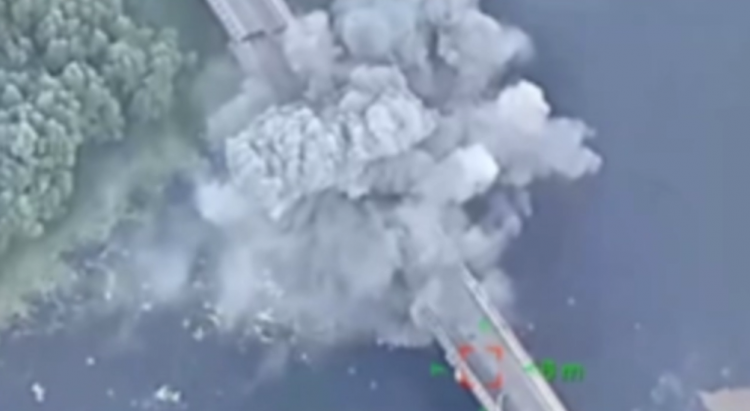Ukraine's ongoing incursion into Russia's Kursk region has intensified as Ukrainian forces have reportedly destroyed or severely damaged all three bridges over the Seym River, according to Russian sources. This bold offensive, now in its third week, marks the first significant attack on Russian soil since World War II and is reshaping the dynamics of the conflict, though its ultimate outcome remains uncertain.
The destruction of these bridges is a critical blow to Russia's logistical capabilities in the region. The bridges, vital for transporting troops and supplies, were targeted by Ukrainian forces in a series of precise strikes that have not only disrupted Russian movements but also trapped an estimated 2,000 to 3,000 Russian conscripts south of the Seym River in the Glushkovsky district. This tactical maneuver by Ukraine has significantly slowed Russia's response to the incursion, which began on August 6.
Over the weekend, Ukrainian Air Force Commander Mykola Oleshchuk shared videos showing the destruction of the bridges, and satellite images analyzed by independent observers confirmed the damage. One of the bridges in Glushkovo has been completely destroyed, while the other two have been heavily damaged, leaving Russian forces scrambling to maintain their positions.
A Russian military investigator acknowledged the severity of the situation, stating that one bridge had been "totally destroyed" while two others were damaged. The extent of the damage and the implications for Russian forces in the area are still unfolding.
Ukraine's advance in Kursk has been rapid and significant. Ukrainian President Volodymyr Zelenskyy, in a recent address, confirmed that his forces have captured over 1,263 square kilometers (488 square miles) of territory, including 93 settlements. This expansion has been described as a "defensive operation" aimed at creating a buffer zone to prevent future attacks from Russia.
Zelenskyy also revealed that the operation had not been disclosed to Ukraine's allies in advance, a decision driven by concerns that the plan might be dismissed as unrealistic. "This is why nobody was told about our preparations. Now the real success speaks for itself," Zelenskyy said, emphasizing that Ukraine's actions have dispelled the notion of Russian "red lines" and demonstrated the effectiveness of its military strategy.
Despite Ukraine's gains in Kursk, the situation remains complex and fluid. Russian forces continue their offensive in eastern Ukraine, particularly around the key logistics hub of Pokrovsk in the Donetsk region. The capture of Pokrovsk would be a significant strategic victory for Russia, compromising Ukraine's defensive capabilities and supply routes in the region.
Russian President Vladimir Putin has responded to Ukraine's incursion with harsh rhetoric, accusing Ukraine of trying to destabilize Russia and comparing its actions to terrorism. "We will punish the criminals. There can be no doubt about that," Putin declared, as he met with mothers of children killed in the 2004 Beslan school attack.
The Ukrainian offensive has also led to significant civilian displacement. Russia's Ministry of Emergency Situations reported that over 122,000 people have been resettled from the Kursk region since the attack began, with more than 500 people leaving dangerous areas in the past 24 hours alone.
In a related development, Ukraine's General Staff claimed responsibility for a massive fire at an oil depot in the Russian town of Proletarsk, which has been burning for three consecutive days. The depot, a critical supply point for the Russian military, was hit by Ukrainian drones, further undermining Russia's ability to sustain its operations in the region.
The Kursk offensive has exposed vulnerabilities in Russia's defenses and raised questions about its ability to respond effectively to Ukraine's bold maneuvers. Analysts suggest that while the operation has boosted Ukrainian morale and created new tactical opportunities, it also carries significant risks, particularly if Ukraine's forces become overextended.
Matthew Savill, director of military sciences at the Royal United Services Institute (RUSI) in London, noted that Ukraine's incursion into Kursk is a double-edged sword. "The Kursk operation is good for Ukrainian morale, changes the narrative, and brings tactical advantages," Savill said. However, he cautioned that the operation "has not had a significant operational impact in terms of Russia's broader campaign. And Ukraine can ill afford to suffer casualties."




